
Butterfly, the Bride looks at law from the outside, using narrative to provide a fresh perspective on the issues of law and social structure---and individual responses to law. This book thoroughly explores relationships between inner and public lives by examining what is ordinarily classified as the sphere of private life---the world of family relationships.
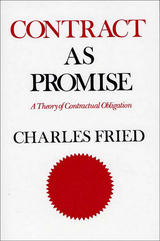
This book displays the underlying structure of a complex body of law and integrates that structure with moral principles.
Charles Fried grounds the basic legal institution of contract in the morality of promise, under which individuals incur obligations freely by invoking each other's trust. Contract law and the promise principle are contrasted to the socially imposed obligations of compensation, restitution, and sharing, which determine the other basic institutions of private law, and which come into control where the parties have not succeeded in invoking the promise principle--as in the case of mistake or impossibility. Professor Fried illustrates his argument with a wide range of concrete examples; and opposing views of contract law are discussed in detail, particularly in connection with the doctrines of good faith, duress, and unconscionability.
For law students and legal scholars, Contract asPromise offers a coherent survey of an important legal concept. For philosophers and social scientists, the book is a unique demonstration of the practical and detailed entailments of moral theory.

This fourth edition of Contract Law in Hong Kong is the most comprehensive contemporary textbook on Hong Kong contract law written primarily for law students. The sixteen chapters of the book cover all basic contract concepts in a reader-friendly style and make ample use of case illustrations, including over 200 new cases since the third edition. The book deals with the core areas of contract law. The new legislative rules, such as the Contract Ordinance regarding the rights of third parties, have also been covered.
The first two chapters introduce the major themes and explain the multiple sources of law in Hong Kong. The subsequent thirteen chapters cover the formation of a valid contract, its contents, "vitiating" elements, the consequences of illegality, the termination of contracts, and remedies for breach of contract. The book concludes with an explanation of the doctrine of privity and the legislative reform of the operation of privity in Hong Kong. Particular attention is given to what makes Hong Kong law different from other common law jurisdictions, and to the continuing significance of English case law in Hong Kong.
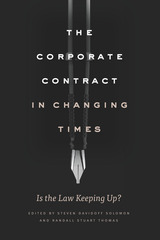
With The Corporate Contract in Changing Times, Steven Davidoff Solomon and Randall Stuart Thomas bring together leading corporate law scholars, judges, and lawyers from top corporate law firms to explore what needs to change and what has prevented reform thus far. Among the topics addressed are how the law could be adapted to the reality that activist hedge funds pose a more serious threat to corporations than the hostile takeovers and how statutory laws, such as the rules governing appraisal rights, could be reviewed in the wake of appraisal arbitrage. Together, the contributors surface promising paths forward for future corporate law and public policy.

Drawing on real-life cases from a wide range of industries, two acclaimed experts offer a sophisticated but accessible guide to business deals, designed to maximize value for your side.
Business transactions take widely varying forms—from multibillion-dollar corporate mergers to patent licenses to the signing of an all-star quarterback. Yet every deal shares the same goal, or at least should: to maximize the joint value created and to distribute that value among the parties. Building on decades of experience teaching and advising on business deals, Michael Klausner and Guhan Subramanian show how to accomplish this goal through rigorous attention to designing incentives, conveying information, and specifying parties’ rights and obligations.
Deals captures the range of real-life transactional complexities with case studies covering Microsoft’s acquisition of LinkedIn, Scarlett Johansson’s contract dispute with Disney over the release of Black Widow, litigation surrounding LVMH’s pandemic-disrupted acquisition of Tiffany, the feud between George Norcross and Lewis Katz over ownership of the Philadelphia Inquirer, NBC/Viacom’s negotiation with Paramount over the final three seasons of Frasier, and many more. In clear, concise terms, Klausner and Subramanian establish the basic framework of negotiation and the economic concepts that must be addressed in order to maximize value. They show how to tackle challenges, such as information asymmetry between buyer and seller, moral hazard, and opportunistic behavior. And the authors lay out responses to common risks associated with long-term contracts, emphasizing that a deal’s exit rights should be carefully considered at the start of transaction design.
Unique in its practical application of economic theory to actual dealmaking, this book will be an indispensable resource for students and for professionals across the business and legal world.
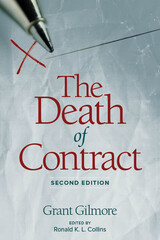
This new edition, with an instructive and timely foreword by Ronald K. L. Collins, challenges anyone interested in the life of the law to think about where it has come from and where it is tending. As such, The Death of Contract still retains its vitality in the brave new world of the law known as contracts. A new bibliography of early reviews and new responses reveals how considerable the interest was, and continues to be, in this modern anti-classic.
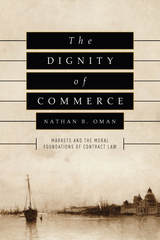
With The Dignity of Commerce, Nathan B. Oman argues persuasively that well-functioning markets are morally desirable in and of themselves and thus a fit object of protection through contract law. Markets, Oman shows, are about more than simple economic efficiency. To do business with others, we must demonstrate understanding of and satisfy their needs. This ability to see the world from another’s point of view inculcates key virtues that support a liberal society. Markets also provide a context in which people can peacefully cooperate in the absence of political, religious, or ideological agreement. Finally, the material prosperity generated by commerce has an ameliorative effect on a host of social ills, from racial discrimination to environmental destruction.
The first book to place the moral status of the market at the center of the justification for contract law, The Dignity of Commerce is sure to elicit serious discussion about this central area of legal studies.

The 1970s was a decade of regulatory triumphalism in North America, marked by a surge in consumer, securities, and environmental regulation. Legal scholars predicted the “death of contract” and its replacement by regulation and reliance-based theories of liability. Instead, we have witnessed the reemergence of free bargaining norms. This revival can be attributed to the rise of law-and-economics, which laid bare the intellectual failure of anticontractarian theories. Scholars in this school note that consumers are not as helpless as they have been made out to be, and that intrusive legal rules meant ostensibly to help them often leave them worse off. Contract law principles have also been very robust in areas far afield from traditional contract law, and the essays in this volume consider how free bargaining rights might reasonably be extended in tort, property, land-use planning, bankruptcy, and divorce and family law.
This book will be of particular interest to legal scholars and specialists in contract law. Economics and public policy planners will also be challenged by its novel arguments.
Contributors. Gregory S. Alexander, Margaret F. Brinig, F. H. Buckley, Robert Cooter, Steven J. Eagle, Robert C. Ellickson, Richard A. Epstein, William A. Fischel, Michael Klausner, Bruce H. Kobayashi, Geoffrey P. Miller, Timothy J. Muris, Robert H. Nelson, Eric A. Posner, Robert K. Rasmussen, Larry E. Ribstein, Roberta Romano, Paul H. Rubin, Alan Schwartz, Elizabeth S. Scott, Robert E. Scott, Michael J. Trebilcock



Benito Arruñada aims to avoid such failures by deepening our understanding of both the value of registries and the organizational requirements for constructing them. Presenting a theory of how registries strengthen property rights and reduce transaction costs, he analyzes the major trade-offs and proposes principles for successfully building registries in countries at different stages of development. Arruñada focuses on land and company registries, explaining the difficulties they face, including current challenges like the subprime mortgage crisis in the United States and the dubious efforts made in developing countries toward universal land titling. Broadening the account, he extends his analytical framework to other registries, including intellectual property and organized exchanges of financial derivatives. With its nuanced presentation of the theoretical and practical implications, Institutional Foundations of Impersonal Exchange significantly expands our understanding of how public registries facilitate economic growth.
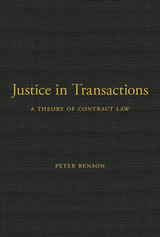
“One of the most important contributions to the field of contract theory—if not the most important—in the past 25 years.” —Stephen A. Smith, McGill University
Can we account for contract law on a moral basis that is acceptable from the standpoint of liberal justice? To answer this question, Peter Benson develops a theory of contract that is completely independent of—and arguably superior to—long-dominant views, which take contract law to be justified on the basis of economics or promissory morality. Through a detailed analysis of contract principles and doctrines, Benson brings out the specific normative conception underpinning the whole of contract law. Contract, he argues, is best explained as a transfer of rights, which is complete at the moment of agreement and is governed by a definite conception of justice—justice in transactions.
Benson’s analysis provides what John Rawls called a public basis of justification, which is as essential to the liberal legitimacy of contract as to any other form of coercive law. The argument of Justice in Transactions is expressly complementary to Rawls’s, presenting an original justification designed specifically for transactions, as distinguished from the background institutions to which Rawls’s own theory applies. The result is a field-defining work offering a comprehensive theory of contract law. Benson shows that contract law is both justified in its own right and fully congruent with other domains—moral, economic, and political—of liberal society.
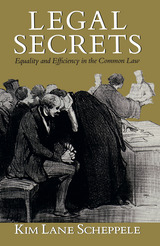
Kim Lane Scheppele answers the question, Which secrets are legal secrets and what makes them so? She challenges the economic theory of law, which argues that judges decide cases in ways that maximize efficiency, and she shows that judges use equality as an important principle in their decisions. In the course of thinking about secrets, Scheppele also explores broader questions about judicial reasoning—how judges find meaning in legal texts and how they infuse every fact summary with the values of their legal culture. Finally, the specific insights about secrecy are shown to be consistent with a general moral theory of law that indicates what the content of law should be if the law is to be legitimate, a theory that sees legal justification as the opportunity to attract consent.
This is more than a book about secrets. It is also a book about the limits of an economic view of law. Ultimately, it is a work in constructive legal theory, one that draws on moral philosophy, sociology, economics, and political theory to develop a new view of legal interpretation and legal morality.


New Directions in Private Law Theory brings together some of the best new work on private law theory, reflecting the breadth of this increasingly important field. The authors adopt a variety of different approaches and contribute to ongoing and important debates about the moral foundations of private law, the individuation of areas of private law, and the connections between private law and everyday moral experience. Questions addressed include: does the diversity identified among claims in unjust enrichment mean that the category is incoherent? Are claims in tort law always about compensating for wrongs? How should we understand the parties’ agreement in a contract? The contributions shed new light on these and other topics and the ways in which they intersect and open up new lines of scholarly inquiry.
This book will be of interest to researchers working in private law and legal theory, but it will also appeal to those outside of law, most notably researchers with an interest in moral and political philosophy, economics, and history.
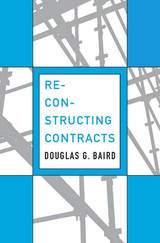
Every legal system must decide how to distinguish between agreements that are enforceable and those that are not. Formal bargains in the marketplace and casual promises in a social setting mark the two extremes, but many hard cases lie between. When gaps are left in a contract, how should courts fill them? What does it mean to say that an agreement is legally enforceable? If someone breaks a legally enforceable contract, what consequences follow?
For 150 years, legal scholars have debated whether a set of coherent principles provide answers to such basic questions. Oliver Wendell Holmes put forward the affirmative case, arguing that bargained-for consideration, expectation damages, and a handful of related ideas captured the essence of contract law. The work of the next several generations, culminating in Grant Gilmore’s The Death of Contract in 1974, took a contrary view. The coherence Holmes had tried to bring to the field was illusory. It was more sensible to see contracts as merely a species of civil obligation and resist the temptation to impose rigid and artificial rules.
In Reconstructing Contracts, Douglas Baird takes stock of the current state of contract doctrine and in the process reinvigorates the classic framework of Anglo-American contract law. He shows that Holmes’s principles are fundamentally sound. Even if they lack that talismanic quality formerly ascribed to them, properly understood they continue to provide the best guide to contracts for a new generation of students, practitioners, and judges.

In the 1980s and ’90s many countries turned to the private sector to provide infrastructure and utilities, such as gas, telephones, and highways—with the idea that market-based incentives would control costs and improve the quality of essential services. But subsequent debacles including the collapse of California’s wholesale electricity market and the bankruptcy of Britain’s largest railroad company have raised troubling questions about privatization. This book addresses one of the most vexing of these: how can government fairly and effectively regulate “natural monopolies”—those infrastructure and utility services whose technologies make competition impractical?
Rather than sticking to economics, José Gómez-Ibáñez draws on history, politics, and a wealth of examples to provide a road map for various approaches to regulation. He makes a strong case for favoring market-oriented and contractual approaches—including private contracts between infrastructure providers and customers as well as concession contracts with the government acting as an intermediary—over those that grant government regulators substantial discretion. Contracts can provide stronger protection for infrastructure customers and suppliers—and greater opportunities to tailor services to their mutual advantage. In some cases, however, the requirements of the firms and their customers are too unpredictable for contracts to work, and alternative schemes may be needed.

In this timely reevaluation of an infamous Supreme Court decision, David E. Bernstein provides a compelling survey of the history and background of Lochner v. New York. This 1905 decision invalidated state laws limiting work hours and became the leading case contending that novel economic regulations were unconstitutional. Sure to be controversial, Rehabilitating Lochner argues that the decision was well grounded in precedent—and that modern constitutional jurisprudence owes at least as much to the limited-government ideas of Lochner proponents as to the more expansive vision of its Progressive opponents.
Tracing the influence of this decision through subsequent battles over segregation laws, sex discrimination, civil liberties, and more, Rehabilitating Lochner argues not only that the court acted reasonably in Lochner, but that Lochner and like-minded cases have been widely misunderstood and unfairly maligned ever since.

Scientific and technological innovations are forcing patent law into the spotlight and revealing its many glaring inadequacies. Take, for example, the patent case that almost shut down the BlackBerry, or the growing phenomenon of patent trolling, in which patents are acquired for the sole purpose of entrapping companies whose products relate to them. And patents on genes have everyone up in arms—and our courts confused.
Robin Feldman explains why patents are causing so much trouble. The problem lies in our assumption that patents set clear boundaries for rights to an invention. In reality, they do no such thing. The very nature of inventions makes them impossible to describe unambiguously for all time. When something is so new that we do not understand yet how it works, what it is capable of doing, or how it could be applied—as is often the case in biotechnology—description is necessarily slippery.
Instead of hoping for clear boundaries, and moaning when we don’t get them, Rethinking Patent Law urges lawmakers to focus on what the law can do well: craft rules that anticipate the bargaining that will occur as rights unfold. By steering clear of laws that distort the bargaining process, lawmakers can help courts answer difficult questions, such as whether genes, software, and business methods constitute patentable subject matter, whether patents in the life sciences should control inventions that have yet to be discovered, and how to resolve the battles between pharmaceutical companies and generics.
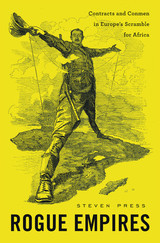
In the 1880s, Europeans descended on Africa and grabbed vast swaths of the continent, using documents, not guns, as their weapon of choice. Rogue Empires follows a paper trail of questionable contracts to discover the confidence men whose actions touched off the Scramble for Africa. Many of them were would-be kings who sought to establish their own autonomous empires across the African continent—often at odds with traditional European governments which competed for control.
From 1882 to 1885, independent European businessmen and firms (many of doubtful legitimacy) produced hundreds of deeds purporting to buy political rights from indigenous African leaders whose understanding of these agreements was usually deemed irrelevant. A system of privately governed empires, some spanning hundreds of thousands of square miles, promptly sprang up in the heart of Africa. Steven Press traces the notion of empire by purchase to an unlikely place: the Southeast Asian island of Borneo, where the English adventurer James Brooke bought his own kingdom in the 1840s. Brooke’s example inspired imitators in Africa, as speculators exploited a loophole in international law in order to assert sovereignty and legal ownership of lands which they then plundered for profit.
The success of these experiments in governance attracted notice in European capitals. Press shows how the whole dubious enterprise came to a head at the Berlin Conference of 1884–1885, when King Leopold of Belgium and the German Chancellor Bismarck embraced rogue empires as legal precedents for new colonial agendas in the Congo, Namibia, and Cameroon.

With an Expanded Appendix on the Current Legal Status of Surrogacy Arrangements
A practice known since Biblical times, surrogate motherhood has only recently leaped to prominence as a way of providing babies for childless couples—and leaped to notoriety through the dramatic case of Baby M. Contract surrogacy is officially little more than ten years old, but by 1986 five hundred babies had been born to mothers who gave them up to sperm donor fathers for a fee, and the practice is growing rapidly. Martha Field examines the myriad legal complexities that today enmesh surrogate motherhood, and also looks beyond existing legal rules to ask what society wants from surrogacy.
A man’s desire to be a “biological” parent even when his wife is infertile—the father’s wife usually adopts the child—has led to this new kind of family, and modern technology could further extend surrogacy’s appeal by making gestational surrogates available to couples who provide both egg and sperm. But is surrogacy a form of babyselling? Is the practice a private matter covered by contract law, or does adoption law govern? Is it good or bad social and public policy to leave surrogacy unregulated? Should the law allow, encourage, discourage, or prohibit surrogate motherhood? Ultimately the answers will depend on what the American public wants.
In the difficult process of sorting out such vexing questions, Martha Field has written a landmark book. Showing that the problem is rather too much applicable law than too little, she discusses contract law and constitutional law, custody and adoption law, and the rights of biological fathers as well as the laws governing sperm donation. Competing values are involved all along the legal and social spectrum. Field suggests that a federal prohibition would be most effective if banning surrogacy is the aim, but federal prohibition might not be chosen for a variety of reasons: a preference for regulating surrogacy instead of driving it underground; a preference for allowing regulation and variation by state; or a respect for the interests of people who want to enter surrogacy arrangements. Since the law can support a wide variety of positions, Field offers one that seems best to reconcile the competing values at stake. Whether or not paid surrogacy is made illegal, she suggests that a surrogate mother retain the option of abiding by or canceling the contract up to the time she freely gives the child to the adopting couple. And if she cancels the contract, she should be entitled to custody without having to prove in court that she would be a better parent than the father.
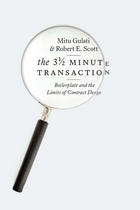
Boilerplate language in contracts tends to stick around long after its origins and purpose have been forgotten. Usually there are no serious repercussions, but sometimes it can cause unexpected problems. Such was the case with the obscure pari passu clause in cross-border sovereign debt contracts, until a novel judicial interpretation rattled international finance by forcing a defaulting sovereign—for one of the first times in the market’s centuries-long history—to repay its foreign creditors. Though neither party wanted this outcome, the vast majority of contracts subsequently issued demonstrate virtually no attempt to clarify the imprecise language of the clause.

Trust, Ethnicity, and Identity deals with the economic role of laws and institutions in achieving social order in a decentralized economy. Specifically, this book considers the coordinating role of three major nonprice institutions--ethnic trading networks, contract law, and gift-exchange--in economizing on transaction costs and thus facilitating the process of exchange in decentralized economies in different historical contexts.
The major unifying theme of the book is this: identity matters when traders operate in an environment characterized by contract uncertainty, where the legal framework for the enforcement of contracts is not well developed. This in turn points out the importance of trust embedded in particularistic exchange relations such as kinship or ethnicity.
One unique facet of this book is that the author uses a property rights--public choice approach--part of the New Institutional Economics--to provide a unifying theoretical framework to explain such diverse exchange institutions as contract law, ethnic trading networks, and gift-exchange, In addition, it goes beyond the New Institutional Economics paradigm by incorporating some crucial concepts from sociology, anthropology, and bioeconomics, such as social structure, social norms, culture, reciprocity, and kin-related altruism. This broad interdisciplinary framework gives Landa's work a relevance beyond economics to law, political science, sociology, anthropology, and bioeconomics.

READERS
Browse our collection.
PUBLISHERS
See BiblioVault's publisher services.
STUDENT SERVICES
Files for college accessibility offices.
UChicago Accessibility Resources
home | accessibility | search | about | contact us
BiblioVault ® 2001 - 2025
The University of Chicago Press









